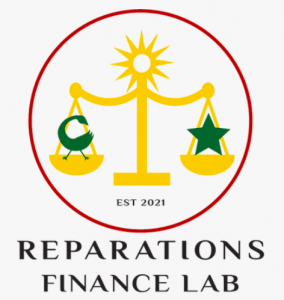Reparations Finance Lab: Closing the Racial Wealth Gap

In the summer of 2020, racial injustice in the United States came to a boiling point when the murders of George Floyd, Breonna Taylor, and others by police officers sparked widespread movements for long-overdue change. One of the many who were inspired to make a difference was Enith Williams, who created the organization Reparations Finance Lab (RFL) in order to shrink the racial wealth gap and begin to provide reconciliation for descendants of the Trans-Atlantic Slave Trade. In addition to founding the organization, she also serves as its Executive Director.
“Enith felt compelled to establish RFL when she saw the global call for justice in the wake of George Floyd’s murder. Because of that tragic event, Enith felt that racial reckoning must include addressing the racial wealth gap,” RFL shared.
Williams moved from Jamaica to the United States in August 2021 to establish RFL. The organization works to close the racial wealth gap by providing analyses and financial models to U.S. reparations groups in order to demonstrate the impact of racially-motivated harmful financial practices, including redlining (a form of financial discrimination based upon geographic location in which people living in lower-income areas may be denied loans, insurance, and other benefits). RFL also identifies methods of reconciliation to help reverse the discrimination against affected communities and ensure that the same injustices do not occur again. The organization’s work extends beyond the United States as well, as RFL consults and shares information with the Caribbean Reparations Movement.
“There is a shift towards increasing diversity, equity, and inclusion in every sector, including education, businesses, and the government. By offering financial interventions, we embrace this shift and hope to accelerate it. These efforts are presented as addressing the racial wealth gap, but at their core, they are moving the country toward an acknowledgment of slavery and systemic racism in the lives of its descendants,” Williams states in her White Paper. “We sense that as a society, we are beginning the overdue process of confronting the legacy of enslavement and what that has meant for issues surrounding social and economic marginalization faced by the descendants. The decision by these organizations to focus on economic interventions is an acknowledgment that the Black population has long been excluded from the full benefits of America’s economic success, despite the fact that slaves’ unpaid labor paved the way for the United States to become a global economic power.”
The financial repercussions of years of discrimination are staggering. According to the nonprofit research organization Brookings, in 2019, the median wealth of a white household was about 7.8 times that of a Black household—a difference of $188,200 to $24,100. When looking at averages, which are more influenced by the wealthiest of households, Brookings reports that white households had an average wealth of $983,400, which is nearly 7 times that of Black households, which had an average wealth of $142,500.¹ The effects of discrimination extend beyond dollars, too.
“The legacy of enslavement has had many repercussions on Black people alive today, including ill health, low educational attainment, and high involvement with the criminal justice system,” Williams states in her White Paper.
According to the National Community Reinvestment Coalition (NCRC), the gap in poverty rates between white and Black communities is significant; in 2019, about 7% of white men and 9% of white women were living in poverty, versus 19% of Black men and 23% of Black women.² The myriad of disadvantages that Black communities face as a result of discrimination affects everything from daily life, like education and employment, to larger-scale changes, like the ability to recover from economic downturns and tragedies like Covid-19.
Through RFL, Williams hopes to even the playing field for those who are experiencing the generational effects of slavery and inequality. Currently, Williams is the only full-time RFL staff member. The organization was incubated by 17 Asset Management, which has provided five Fellows and three Senior Fellows to assist with its growth.
“Two of our biggest challenges at this time are securing funding and finding ways to approach the financial sector to ‘buy into’ this work. With consistent funding, we can continue and expand our work by creating prototypes and models for financial products that will deliver reparative capital to the descendants of the Trans-Atlantic Slave Trade around the globe. Although there is much talk about reparations, the actions have been limited; however, there have been some great strides. We look forward to being a part of making greater strides,” RFL said.
To support Reparations Finance Lab, please get in touch with HSI, donate here or click here to learn more.
SOURCES:
¹ Brookings, 2020: “The Black-white wealth gap left Black households more vulnerable.” https://www.brookings.edu/blog/up-front/2020/12/08/the-black-white-wealth-gap-left-black-households-more-vulnerable/
² National Community Reinvestment Coalition (NCRC), 2022: “Racial Wealth Snapshot: Women, Men, And Racial Wealth Divide.” https://ncrc.org/racial-wealth-snapshot-women-men-and-racial-wealth-divide/
